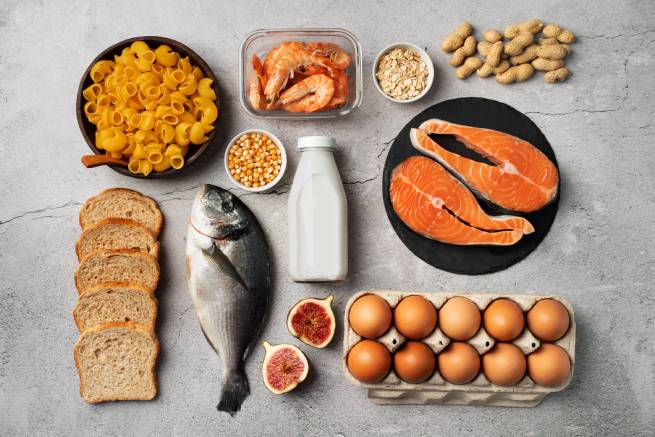Albumin is a type of protein that plays a crucial role in many aspects of human health. Consuming foods that are rich in quality protein is essential for maintaining health and wellness. In this article, we will discuss the importance of albumin in human health and the foods that can help support albumin levels.
What is Albumin and its importance in human health
Albumin is a soluble protein that is produced in the liver and is the most abundant protein in the blood plasma. It is a vital component of the body's fluid balance system and is responsible for regulating the movement of fluid in and out of cells. It acts as a carrier for various substances in the blood, such as hormones, enzymes, and medications, and helps to maintain proper blood pressure. Additionally, it helps to maintain the proper concentration of calcium in the blood, which is important for many physiological processes.
Also, albumin helps to transport essential substances to injured tissues, aiding in wound healing, preventing swelling or edema. It also plays a role in building and repairing tissues and aiding in the functioning of enzymes and hormones.
Why high quality protein foods are essential
The human body needs a constant supply of albumin to perform its several functions, such as regulating fluid balance, supporting wound healing, regulating blood pressure, building and repairing tissues, and aiding in enzyme and hormone functions. However, the body cannot produce enough albumin on its own, so it is important to consume high quality protein foods.
High quality protein foods provide the body with the building blocks it needs to produce more albumin, and they also help to maintain optimal levels of this protein in the blood, help support albumin's many functions and maintain overall health and well-being. Examples of these foods include meat and poultry, fish, dairy products, eggs, legumes, and nuts.
Foods that help Support Albumin Levels
In order to maintain adequate levels of albumin in the body, it is important to consume foods that are rich in protein. These foods can help to support the functions of albumin and maintain optimal health.
Meat and Poultry
Meat and poultry, such as beef, chicken, turkey, and pork, are excellent sources. These foods provide high-quality protein that is easily absorbed and utilized by the body. Consuming a serving of meat or poultry at least once a day can help to increase albumin levels over time.
Fish
Fish, such as salmon, tuna, and halibut, are also excellent sources of protein. These foods are not only high in protein but are also a good source of omega-3 fatty acids, which have numerous health benefits. Eating fish at least twice a week can help to increase albumin levels over time.
Dairy Products
Dairy products, such as milk, cheese, and yogurt, are good sources of protein. These foods also provide calcium, which is essential for bone health, and other important nutrients. Consuming dairy products on a daily basis can help to ensure adequate protein intake to aid in increasing albumin levels.
Eggs
Eggs are an excellent source of high-quality protein. They are also a good source of vitamins and minerals, such as vitamins B12 and D, and choline. Eating eggs on a regular basis can help to increase albumin levels over time.
Legumes and Nuts
Legumes, such as beans, lentils, and peas, and nuts, such as almonds and walnuts, are good plant- based sources of protein. These plant-based foods are also a good source of fiber, which can help to regulate digestion and support overall health. Including legumes and nuts in the diet can help to increase albumin levels over time.
It is important to note that a balanced diet, including a variety of different protein sources, is the key to ensuring optimal health and wellbeing.
What are signs of low albumin?
Low levels of albumin can lead to several noticeable symptoms and signs. Some of the most common signs of low albumin levels include:
- Swelling or Edema: Swelling or edema is one of the most common signs of low albumin levels. This occurs when fluid accumulates in the tissues, causing swelling and discomfort, particularly in the legs, ankles, and feet.
- Bruising or Bleeding Easily: Low albumin levels can also cause bruising or bleeding easily, as albumin helps to maintain proper blood flow and prevent excessive bleeding.
- Fatigue: Fatigue is another common sign of low albumin levels, as albumin helps to maintain energy levels by transporting nutrients and oxygen throughout the body.
- Weakness: Low albumin levels can also cause weakness, as albumin is necessary for maintaining muscle mass and strength.
- Decreased Immunity: Low albumin levels can also impair the body's ability to fight off infections, as albumin is involved in the immune response.
- Poor Appetite: Low albumin levels can also lead to poor appetite, as albumin is involved in regulating hunger and metabolism.
It is important to note that these symptoms can also be caused by other factors, and a doctor should be consulted for proper diagnosis and treatment.
The role of protein supplements in compensating low albumin levels
Protein supplements are a convenient and effective solution for those who struggle with low albumin levels. Vidafuel Wellness Protein provides the body with high-quality whey protein including all 20 amino acids, which is essential for supporting proper albumin levels in the blood.

BUY VIDAFUEL WELLNESS PROTEIN DRINKS
Whether you are looking to improve your overall health, support your immune system, or build lean muscle mass, Vidafuel Wellness Protein is an excellent choice.

